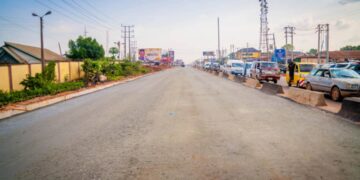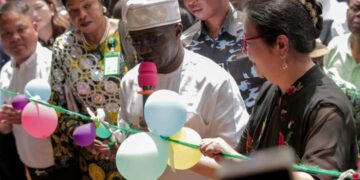Over a year ago, the fashion designer relocated her small family from Lagos, Nigeria’s largest metropolis, to London, the capital of the United Kingdom. Her artist spouse and business partner Osione was given a Global Talent visa so that he could pursue his career in the United Kingdom.
She explains that they left Lagos because it had grown too expensive to raise their little family there. “The value of our currency steadily declined. We couldn’t keep up with our regular responsibilities like paying bills or buying groceries.”
Oroma returned to Nigeria about 20 years ago after studying law at the University of Northumbria in the United Kingdom. She was eager to put her education to use in the effort to improve her home nation. She and Osione finally founded This Is Us, a sustainable clothing and accessories label that employs local materials and craftsmen and features items made from cotton produced and coloured in northern Nigeria.
Initially, they were oblivious to the effects of the cost of living problem.
For Oroma, “things were not as horrible for us as they were for other people” because their supplies come from within Nigeria. So, when everyone else was raising prices, we only raised them once instead of twice because we had the financial flexibility to do so.
Cookey, Oroma
Because of the high expense of living in Nigeria, Oroma Cookey Gam (caption) has relocated to London.
However, over time, their Nigerian clientele had difficulty spending money on products that weren’t necessary, such as clothing, given that 63% of their income goes toward food. If consumers have to spend a larger portion of their income on food, their discretionary money will also decrease.
Oroma claims that the situation in Nigeria is particularly dire for the country’s youth. “After having a conversation with my mom, I concluded that their lives were simpler when they were younger. They had enough money to buy homes and vehicles.
“I often wondered, “What the heck is wrong with me?” I’ve finally accepted that this nation is not working for me since I can’t accomplish all my mother did.”
Many others share her sentiments, therefore she is not alone. The current outflow of Nigerians is the largest in the country’s history. It’s difficult to acquire accurate data, but the number of Nigerians given work visas to the United Kingdom has doubled since 2019. And there is a 700% increase in student visas for Nigeria.
Every day, people wait in large lines outside of immigration offices and embassies, and it seems like everyone here is connected in some way to someone who is leaving or attempting to migrate overseas.
The Yoruba word japa, which meaning “to run, leave, or escape,” has exploded in popularity recently, both in internet forums and on radio and television talk shows.
Those who are able to lawfully leave the nation often have higher incomes and more education. Professionals in the medical, nursing, engineering, and information technology fields are among them. Some have referred to this departure as a “brain drain.”
At least 50 physicians a week leave Nigeria to work overseas, according to the Nigeria Medical Association. The major reasons are lousy working conditions, low salary, and growing living expenses.
In the city of Ibadan, in the country’s southwest, lives and works Kunle Ibisola, a former medical intern at the University College Hospital (UCH). This man has recently taken a position with NHS Scotland.
Kunle Ibisola, M.D.
Dr. Kunle Ibisola told me over the phone that he and his family relocated from Ibadan to Scotland, and that they plan to eventually settle there. “I had no desire to ever leave Nigeria. My original plan was to begin my residency there, complete my consultant training, and then return to my home country to practise medicine.
“Salary and living expenses were the primary motivating factors in my decision to leave. With six to eight hours of locum work [overtime] each week in the United Kingdom, I may earn the equivalent of a monthly wage in Nigerian naira. What’s more, that’s not even counting my primary income in the UK.”
He claims that physicians have been leaving his Nigerian hospital in droves since last year.
“Due to a glitch in the government payment system, some doctors were left unpaid for as long as nine months. The cost of a car or school tuition was too much for several of my older coworkers. For many, that served as a wake-up call.”
There are current plans for his family to join him in Scotland. When I inquire as to his thoughts on Nigeria’s future, he seems thoughtful.
“It’s discouraging to dwell on, as everyone in medical school right now has plans to eventually graduate and leave. People assume the worst about you if you don’t appear to be packing your bags and leaving soon.”
I’ve talked to at least six different physicians, and they all tell me much the same thing. Due to long hours and little pay, they all left the company during the previous two years and set up shop elsewhere.
That puts a lot of stress on those who stayed behind. According to SBM Intelligence economic researcher Cheta Nwanze, food inflation is a major contributor to Nigeria’s current high rate of inflation.
He says that SBM uses the price of the West African staple meal Jollof rice and tomatoes as a proxy for food inflation. “We work out how much money it takes to cook jollof rice for a household of five on average. More than doubling in only five years, from around $4,000 at the beginning of 2016 to nearly $20,000 (£18,000) today.”
“Jollof rice”
A staple food in West Africa, jollof rice has lately seen a sharp increase in price in Nigeria.
He argues that while global events like the conflict in Ukraine and the impending 2020 pandemic have had an impact on inflation rates in Nigeria, the country also faces challenges specific to it.
He claims that Islamist terrorists and kidnappers have prevented many farmers in the north, where much of the country’s food comes from, from planting their crops in recent years.
Because of the government’s protectionist policies toward food imports and the country’s rapidly expanding population, food prices in Nigeria have been rising.
Financial markets around the country have already felt the effects. Normally bustling with shoppers, Ajah, a residential neighbourhood of Lagos, is unusually quiet on a recent Sunday.
Under a large canopy, market vendor Omowunmi Ajekigbe grates okra. “She explains, “Last year, things weren’t too pricey, but this year, it’s too much. Used to be there were a lot of people racing about, but today there’s hardly anyone there at all.
Cordelia Fidelis, a young woman with long hair and a wide grin, is now engaging in some vigorous bargaining with a vegetable vendor at a neighbouring stand. As the owner of a catering company, she frequents the local farmers’ market.
“There has been a worrying increase in the price of items; the cost of yams, for example, has more than doubled in only two months. Seriously, it’s ridiculous that prices are so high for everything. Pricey items include eggs, meat, and palm oil.”
Many people out and about in Lagos
Caption for images,
Lagos is the largest metropolis in Nigeria, and many residents there rely on private food banks to help them put food on the table.
Some people have resorted to extreme measures in an attempt to control their costs. A former schoolteacher, Angela Chukwulozie is now in the business of selling Italian footwear. “The rising cost of living has forced me to reduce the number of daily meals I provide for my family. Only two meals a day are consumed now instead of the traditional three.”
Many people will be voting in the midterm elections next month, and the economy is a major factor in their decision. Despite being the largest economy in Africa, the World Bank estimates that 41% of Nigerians are poor. There is widespread doubt about the contenders’ ability to fulfil their promises to enhance the country’s economy if they are elected.
The Central Bank claims that the deadline of 10 February, when the old banknotes will no longer be legal money, will encourage people and businesses to deposit some of the cash they have been hoarding.
The report claims that 80% of currency in circulation is not held by financial institutions. The government is making the switch in the hopes of gaining a clearer picture of the economy’s monetary flow, which will allow for more precise control of inflation. The question of whether or not it will be successful remains open.
Despite the difficulties Oroma’s home nation is going through, she remains hopeful when she returns to London.
“Nothing beats the comforts of your own home. About once every three months, I have to make the trip back to Nigeria because I feel like I’m going to die otherwise.
“In my opinion, Nigeria is at a turning point when it is still possible to effect positive change. In order to get by, we just require the barest of infrastructures, such as public schools, power plants, and highways. Nigeria has incredible potential if we can only fix these three issues and boost security there.”









